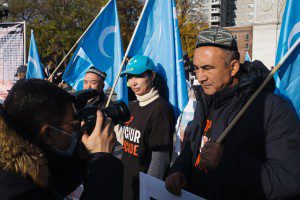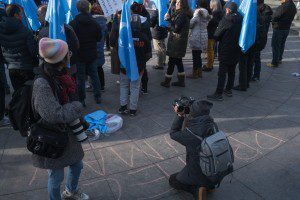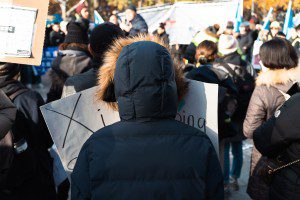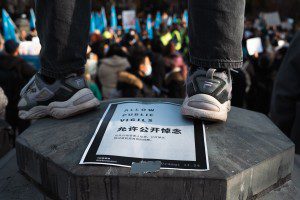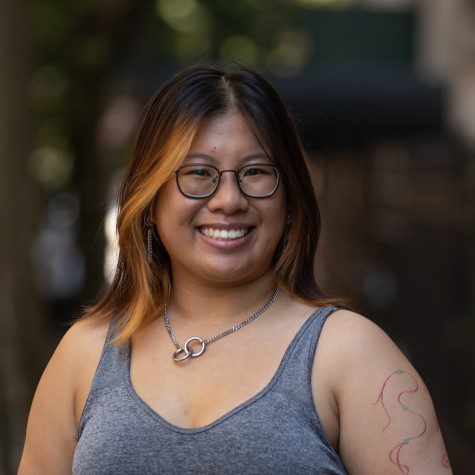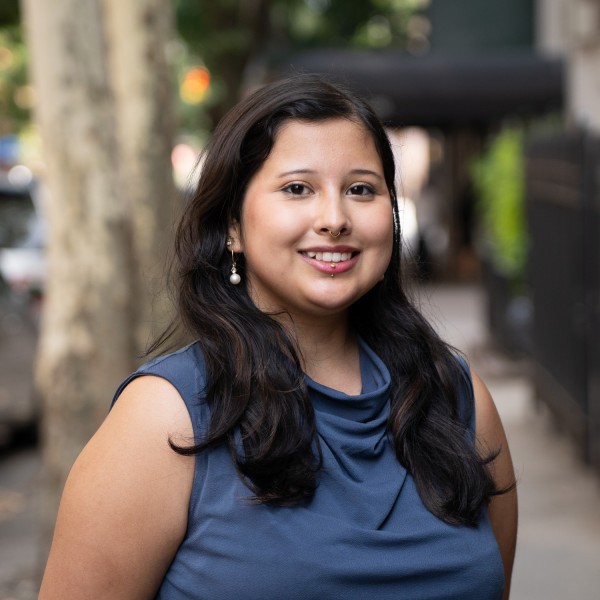Chinese students, diaspora rally in solidarity as protests in China broaden in scope
As protesters in China grow increasingly critical of the government, satellite protests around the world, including those in New York City, follow suit.
December 5, 2022
Read this article in Simplified Chinese or in Traditional Chinese.
点击此处阅读简体中文版 | 點擊此處閱讀繁體中文版
Hundreds of protesters flooded Washington Square Park to condemn the Chinese government’s rigid response to the pandemic, and accuse it of overreaching its authority in Tibet and Hong Kong, during a rally on Sunday, Dec. 4. Protests against the zero-COVID policy in China kicked off a wave of international demonstrations, but protesters are going further, with many now challenging the Chinese Communist Party as a whole.
“Today, the torch of freedom is picked up by the younger generation,” Zhou Fengsuo, a survivor of the Tiananmen Square massacre, said at the gathering. “We have to fight. We will end the CCP.”
Eleven organizations hosted the “NYC in Solidarity With Those Oppressed by CCP” rally, many representing groups from the Chinese diaspora. Among others, the Hong Kong Student Advocacy Group at NYU, Students for a Free Tibet, Free Uyghur Now, the Democratic Party of China and Keep Taiwan Free protested the country’s COVID-19 policies while expressing opposition to the CCP’s past and present oppression of their individual groups.
“We have so many groups today,” said an NYU student from Hong Kong, who requested to be unnamed due to fear of reprisal. “We are facing the same thing. It’s very important that we will come together and support each other.”
Behind a large crowd of activists, a semicircle of attendees waved the Kökbayraq flag, unofficially used to represent the Uyghur community. In the crowd, many others wore Tibetan flags around their shoulders. Attendees and speakers challenged the government’s actions in Tibet and Hong Kong, where police violently cracked down on demonstrators calling for democratic reform.
“Today was not only to stand in solidarity with all of those experiencing such extreme repression and oppression under the Chinese government, but also to build this cross-movement coalition and solidarity,” said Tsela Zoksang, an NYU undergraduate and Students for a Free Tibet activist.
In recent years, the Chinese government has sent three out of four Tibetan children — an estimated 800,000 children between the ages of six and 18 — to state-run colonial boarding schools.
“[Tibetans have] been laboring for our freedom for so many years,” Topjor Tsultrim, a Students for a Free Tibet activist, said. “We feel that this time can be different because the Chinese people have woken up to the oppression that they have been facing for the past seven decades: the suppression of their free speech. And now with zero-COVID policy, the denial of their basic right to movement.”
The most recent wave of protests broke out on Nov. 25 after 10 residents died in an apartment fire in Xinjiang. Activists have said that the casualties could have been prevented if firefighters had not been hindered by lockdown measures. China’s zero-COVID policies require cities to shut down — sometimes for several months — over a small number of cases.
The policies have shaken international confidence in Chinese markets and halved the nation’s growth rate. In response to the protests across major cities, some local governments have eased their COVID-19 guidelines. In Shanghai, negative tests will no longer be required to use public transportation, and Zhengzhou will allow karaoke bars and beauty salons to reopen.
“The lockdown policies in major cities are getting looser,” said another NYU student, a Chinese national who also requested not to be named. “The PCR test policies in the cities back home are getting abolished, which is pretty good, but there’s a long way to go.”
Protests in solidarity have sprung up across New York City in the past several weeks. One took place last week at Washington Square Park and another in front of the Chinese consulate in Hell’s Kitchen. Another at Columbia University early last week drew hundreds of organizers, activists and students.
Contact Mayee Yeh and Tori Morales at [email protected].































































































































































